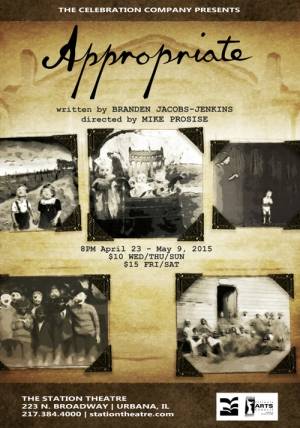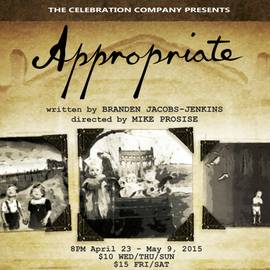As the youngest of three children, I often marvel at the varied experiences my siblings and I have. Sometimes I think my brother must be delusional because of what he remembers, and I wonder whose mother my sister could possibly be describing when she talks about our childhood. It never occurred to me until corresponding with Mike Prosise, director of the Station Theatre’s upcoming production of Branden Jacobs-Jenkins’ Appropriate, that all three of us could be correct. The central characters in the play face a similar conflict.
The press release summarizes the play as follows:
In Appropriate, every estranged member of the Lafayette clan has descended upon a crumbling Arkansas homestead to settle the accounts of their newly-dead patriarch. As his three adult children sort through a lifetime of hoarded mementos and junk, they collide over clutter, debt, and a contentious family history. But after a disturbing discovery surfaces among their father’s possessions, the reunion takes a turn for the explosive, unleashing a series of crackling surprises and confrontations.
Prosise’s affection for a rich family drama is evident in his responses. Read on for his insightful commentary on this timely play.
———
Smile Politely: What drew you to the script?
 Mike Prosise: I’m fascinated by how the human brain collects, warps, and processes memories. And I love old abandoned buildings. Ancient objects have textures, smells, colors, etc. that can trigger such strong memories… It almost makes me believe in ghosts. And this play really is a kind of ghost story. Not in a scary sense. But more in the sense that the three main characters (who are siblings) are all haunted by memories of growing up with their parents and with each other. But because their parents’ lives changed drastically and quickly during the siblings’ formative years, their childhoods vary greatly. Yet, they still assume that each of their memories is absolute FACT. They refuse to acknowledge that their siblings’ different ages, personalities, and neuroses could cause them to remember it all differently. The conflict over how they remember dead family members creates a tyrannical ghost that haunts every conversation among the people who are left behind.
Mike Prosise: I’m fascinated by how the human brain collects, warps, and processes memories. And I love old abandoned buildings. Ancient objects have textures, smells, colors, etc. that can trigger such strong memories… It almost makes me believe in ghosts. And this play really is a kind of ghost story. Not in a scary sense. But more in the sense that the three main characters (who are siblings) are all haunted by memories of growing up with their parents and with each other. But because their parents’ lives changed drastically and quickly during the siblings’ formative years, their childhoods vary greatly. Yet, they still assume that each of their memories is absolute FACT. They refuse to acknowledge that their siblings’ different ages, personalities, and neuroses could cause them to remember it all differently. The conflict over how they remember dead family members creates a tyrannical ghost that haunts every conversation among the people who are left behind.
Also, I’ve always been a sucker for a good, shit-kicking family drama. The awful discomfort of watching these siblings hash out their issues, while the dissonant memories of their Dad are lingering in the air, is so delectably exciting. It’s even more exciting to stage it in such an intimate space, where the audience is so physically close to the conflict.
SP: What can you tell me about your cast?
Prosise: I’m a fairly new director, but I’ve often heard the credo that assembling a good cast is 90% of the director’s job. That has certainly proven true again, in this case. From top to bottom, this is one of the most focused, emotionally intelligent casts I’ve ever worked with.
The three siblings: Carolyn Kodes-Atkinson (as Toni), David Barkley (as Bo), and Aaron Clark (as Franz) have done so much homework on their characters’ backgrounds. That’s a normal part of an actor’s prep, but these three have been so focused that it really makes it fun (and challenging) as a director to watch them come in and bring a billion new layers to a scene every time we rehearse it.
The remaining ensemble (and this really IS an ensemble show) is similarly focused. June Eubanks (as Rachael) and Heather Harris (as River) each bring vastly contrasting personalities, goals, and tactics to the mix, and it’s compelling to watch their otherwise compassionate characters get swept up into the unceasing violent conflict among the siblings.
One thing that made me anxious about proposing this show was the three younger actors that were needed even though it’s definitely not a kid-appropriate play. All of three them need to “play” very young on stage, but the actors themselves have to be incredibly wise. Luckily, Ellen Magee (as Cassidy), Ellison Radek (as Ainsley), and regular Station Theatre actor Sidney Germaine (as Rhys) showed up to fill the roles, and they’re all dynamite.
One thing I absolutely love about my actors is that—even though they are all, in a real, objective sense, very attractive people—they aren’t afraid to be ugly. Ugliness is so human, so authentic, yet it’s hard to find actors who are willing to go there. I truly lucked out with this group of people.
SP: The Station Theatre has staged several family dramas lately: 3000 Miles, Wintertime, Mothers and Sons… the list goes on. What sets this story apart from the others?
 Prosise (pictured, left): I love the “family drama” genre so much because it serves as a great backdrop for pretty much anything you want to discuss. Whether we’re born into them, or we inherit them, or we just choose them, almost all people have families. It’s universal. The plays you list were all part of this genre, yes. They were great productions, yet they all had very different themes, aesthetics, and dynamics. This particular family drama is different from the others you mentioned because it deals with some different issues: memory, trauma, addiction, race in America, cicadas, and many others. Also, the Station Theatre’s recent family dramas were, while certainly dark at times, more well-mannered than Appropriate. This play rarely allows its characters to display anything resembling good manners.
Prosise (pictured, left): I love the “family drama” genre so much because it serves as a great backdrop for pretty much anything you want to discuss. Whether we’re born into them, or we inherit them, or we just choose them, almost all people have families. It’s universal. The plays you list were all part of this genre, yes. They were great productions, yet they all had very different themes, aesthetics, and dynamics. This particular family drama is different from the others you mentioned because it deals with some different issues: memory, trauma, addiction, race in America, cicadas, and many others. Also, the Station Theatre’s recent family dramas were, while certainly dark at times, more well-mannered than Appropriate. This play rarely allows its characters to display anything resembling good manners.
SP: In an interview, Branden Jacobs-Jenkins said that the play may seem familiar because he “ended up deciding [he] would steal something from every play that [he] liked and put those things in a play and cook the pot to see what happens.” What parts of the play seem familiar to you? Do the parts Jacobs-Jenkins stole work well together?
Prosise: Before answering, I’ll say that I read that interview shortly after I finished reading the play. I had an “AHA!” moment since the play felt so creepily familiar. I did a little digging and soon after, I read in American Theatre Magazine a contrary quote from Alex Barron, literary manager at the Playwrights Realm: “I find that when I see one thing, Branden sees 10 things. His work represents the struggle to show an audience how these 10 things are all indelibly connected. The story of a dysfunctional family in Appropriate is actually about ghosts and class and self-loathing and cicadas and Chekhov and faith and the centuries-old legacy of slavery.”
I really liked Jacobs-Jenkins’s openness in talking about “stealing” from a bunch of plays, although I don’t think he “stole” material any more than most other contemporary playwrights. I’ve heard this play described as August Osage County, version 2.0. It’s not the same story, but you can’t really argue that it’s a very similar backdrop: family secrets emerge and conflict ensues.
Overall, I do sense a lot of Tracy Letts (my favorite playwright) in Appropriate: The slow reveal of secrets; the decay of the physical surroundings; the dry, dark humor; the sudden, horrific bursts of violence. I also see some Anton Chekov in there: the inescapability of family legacy; the massive, potentially chaotic ensemble scenes. Jacobs-Jenkins may have recycled some of these tried-and-true storytelling devices, but he does it so well that it still feels fresh to me.
SP: How—if at all—do the themes of the play tie into the current political climate in the US, especially considering the deaths of Michael Brown, Trayvon Martin, and Eric Garner?
 Prosise: A few months ago, American Theatre Magazine published an article listing the ten most relevant plays to produce in post-Ferguson America, and Appropriate was right at the top. It’s unique in that it’s a play that swims around in the guts of the “Race in America” issue, it’s written by a young African-American playwright, and yet there are no people of color in the cast of characters.
Prosise: A few months ago, American Theatre Magazine published an article listing the ten most relevant plays to produce in post-Ferguson America, and Appropriate was right at the top. It’s unique in that it’s a play that swims around in the guts of the “Race in America” issue, it’s written by a young African-American playwright, and yet there are no people of color in the cast of characters.
It’s subversive in doing so, but the play gathers up 150 years of racial injustice and effectively pins it on the white middle-class Midwestern family. This, of course, is an accusation that infuriates so many people. It’s so often met with a chorus of, “My family didn’t own slaves!” and “I’ve earned everything I have!” and so on. Yet the play is a subtle display of how this family has benefitted, is benefitting, and will continue to benefit from racial injustice without ever accepting—or even realizing—it. It really is an untenable situation for the future of this family, and our future as a society. We’ve forgotten how to talk to each other, and we’ll have to completely change the paradigm to achieve real progress.
Furthermore, the play shines a light on the sick commoditization of the bodies and deaths of black people. From the spectacle lynchings of long ago to the modern YouTube and 24-hour media cycle rerunning the death scenes of young black men, American society seems eerily comfortable using these grisly scenes to inspire action, both positive and negative. Appropriate should hopefully stir up some strong feelings about the sense of ownership, commoditization, and exploitation surrounding the recent deaths of Martin, Brown, Garner and so many others.
———
Appropriate will run from Thursday, April 23rd through Saturday, May 9th. All shows begin at 8 p.m. Admission is $10 on Wednesdays, Thursdays, and Sundays; $15 on Fridays and Saturdays. To make a reservation, call 217-384-4000 or reserve online via stationtheatre.com.








